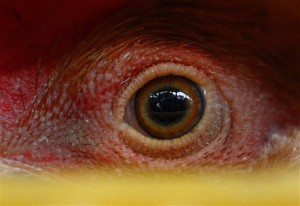
In this April 11, 2013 file photo, a chicken is kept in a cage waiting to be inspected by health workers in Hong Kong. AP
HONG KONG — Hong Kong will quarantine 17 people after the city confirmed its first human case of the deadly H7N9 bird flu, officials said Tuesday.
The 17 are mostly relatives of the employer of a 36-year-old Indonesian domestic helper, who is in critical condition in a Hong Kong hospital after a visit to mainland China.
They were all taken to hospital for observation.
“If those who had been in close contact (with the patient) don’t have symptoms, we will later arrange for them to enter quarantine facilities,” health minister Ko Wing-man told a press conference.
“Tonight, five people who were in close contact and do not show signs of infection will enter the quarantine,” Ko said, adding that they will be held until 10 days after their last contact with the carrier.
A government statement later said all 17 people had tested negative for the virus, but would be sent to a holiday village in the seaside town of Sai Kung “for medical surveillance.”
The Indonesian domestic helper had a history of travelling to the mainland city of Shenzhen, just across the border with Hong Kong, and coming into contact with live poultry, Ko said Monday.
“She has a history of travelling to Shenzhen, buying a chicken, slaughtering and eating the chicken,” Ko said.
She was admitted to hospital on November 27 after developing a cough and shortness of breath.
The city has suspended imports of live poultry from Shenzhen and escalated its flu contingency plan to “serious.”
“At this point, we reckon it could be an imported case, but the government will continue to follow this up with full effort,” said Hong Kong Chief Executive Leung Chun-ying.
In all, 137 human cases of H7N9 have been reported in mainland China since February with 45 deaths, according to the World Health Organization.
In April Taiwan reported its first case, a 53-year-old man who had been working in eastern China.
The man was eventually discharged but the case prompted the island’s authorities to begin research into a vaccine which they hope to roll out by late 2014.
In August Chinese scientists reported the first likely case of direct person-to-person transmission of H7N9. But they stressed that it was still difficult for the virus, believed to jump from birds to people, to spread between humans.
Avian flu viruses have been around for a very long time in wild birds. They do not generally cause disease in humans, though in rare cases they mutate and jump species.
Hong Kong is especially alert to the spread of viruses after an outbreak of Severe Acute Respiratory Syndrome (SARS) swept through the city in 2003, killing 299 people and infecting around 1,800.